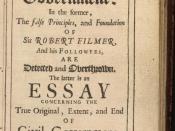In an age named after a word that means to give spiritual or intellectual insight or to give information to, to inform or instruct (dictionary.com), it is not surprising that an enormous amount of politically related literary work was published. The nature of these works concern Nature itself. In Samuel Johnson's "A dictionary of the English Language", he defines nature in eleven different ways (Norton, 200), all of which reflect the ideals of his time. Today, the definition of nature is barely different, even in the context examples given (dictionary.com). Many other writers of the time produced works concerning nature, mostly focused on the nature of man and his place in nature.
Alexander Pope's philosophical poem (Norton, 2000), "An Essay on Man", in which he states that "the proper study of mankind is Man." (Norton, 2000), is highly representational of a specific line of thought in the 18th century. This line of thought is that Man is a rational, reasonable creature in both civilized society and in a state of nature, and that Man can and should understand himself, but cannot understand God.
Therefore, Pope's statement in his poem means that, according to this line of thought, Man should accept God as extant, all knowing, but unfathomable, and should focus on the nature of mankind itself. This is known as Deism, or, "the belief, based solely on reason, in a God who created the universe and then abandoned it, assuming no control over life, exerting no influence on natural phenomena, and giving no supernatural revelation" (dictionary.com)
The idea that humans are not meant to know everything and that all understanding has a natural limit is also shown in Jonathon Swift's "Gulliver's Travels". He attacks theoretical knowledge in particular, and his portrayal of the Laputans, who antipathy for those who are...


![[Portrait of Abe Most, Pete Ponti, Sid Jacobs, and Jimmy Norton, Hickory House, New York, N.Y., ca. June 1947] (LOC)](https://s.writework.com/uploads/9/94582/portrait-abe-most-pete-ponti-sid-jacobs-and-jimmy-norton-hi-thumb.jpg)